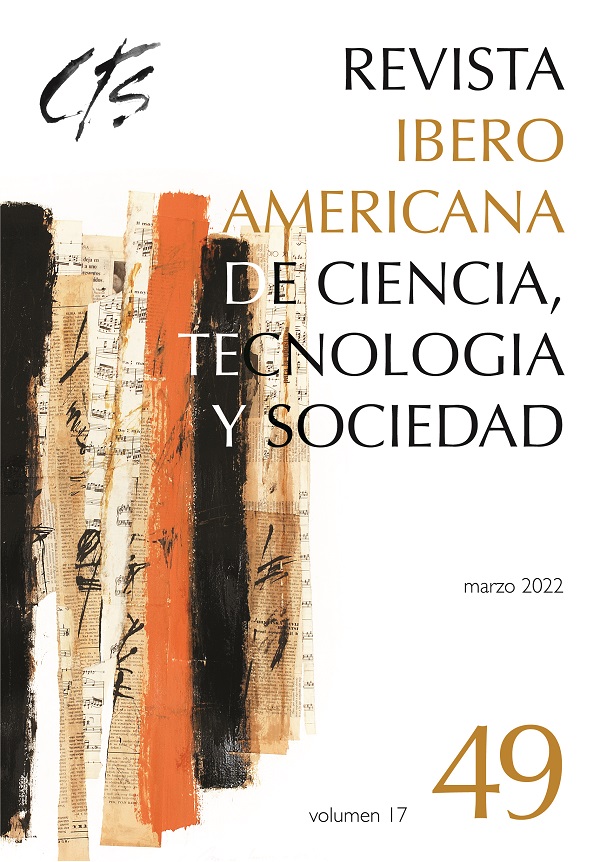The Debate on Glyphosate in Colombia: Scientific-Technological Controversy and Regulatory Science
Keywords:
glyphosate, illicit crops, regulatory science, public scientific-technological controversy, scientific evidence, rhetoricAbstract
This paper addresses the debate on the application of glyphosate in Colombia through the theoretical tools of public scientific-technological controversies in a regulatory science framework. The dispute involves a great diversity of actors: the United States, that understand the fumigations as a way to limit drug trafficking at source; Colombia, which sees national security at stake; peasants who grow marijuana, poppies, coca, and peasants who do not grow it (natives and Afro-descendants), but are affected by the spraying; the regions affected in the process of eradication of illicit crops with glyphosate; and Ecuador. This controversy is intended to be solved through scientific evidence. It is essential to investigate the nature of the disagreement regarding it, highlighting how it emerges in contexts of uncertainty. This disagreement is reflected in disputes about what constitutes evidence of harm, which generalizations are admissible, which experiments can be performed and which models are the most suitable for regulatory decision making. The dispute over the evidence is interwoven with political, economic and moral factors in such a way that the evidence that was intended to legitimize the political decision becomes just one more argument in the discussion.Downloads
References
Arancibia, F. (2011). Controversias científico-reguladoras y activismo: el caso de los agroquímicos para cultivos transgénicos en la Argentina. En F. Tula y A. Vara (Comps.), Riesgo, política y alternativas tecnológicas: entre la regulación y la discusión pública (289-334). Buenos Aires: Prometeo.
Bartual Sánchez, J. (1984). NTP 108: Criterios toxicológicos generales para los contaminantes químicos. Instituto Nacional de Seguridad e Higiene en el Trabajo, Ministerio de Trabajo y Asuntos Sociales España.
Carpenter, D. y Moss, D. (2014). Preventing regulatory capture: special interest influence and how to limit it. Cambridge: Cambridge University Press.
Comisión Científica Ecuatoriana (2007). El sistema de aspersiones aéreas del plan colombia y sus impacto sobre el ecosistema y la salud en la frontera ecuatoriana. Quito: Manthra Editores.
Environmental Protection Agency (1993). Reregistration Eligibility Decisión (RED) Glyfhosate. Office of Prevention, Pesticides and Toxic Substances, Office of Pesticide Programs. Washington, DC: Government Printing Office.
European Food Safety Authority (2015). Conclusion on the peer review of the pesticide risk assessment of the active substance glyphosate. EFSA Journal 2015, 13(11), 4302, 1-107. DOI: 10.2903/j.efsa.2015.4302.
Food Agriculture Organizacion of the United Nations (2016). Pesticide residues in food 2016. Joint FAO/Who meeting on pesticide residues. Fao Plant Production Paper, 229. Recuperado de: http://www.fao.org/3/a-i5693e.pdf.
Functowicz, S. y Ravetz, J. (2000). La ciencia posnormal. Barcelona: Icaria Editorial.
González, S. (2006). El programa de erradicación de cultivos ilícitos mediante aspersión aérea de glifosato, hacia la clarificación de la política y su debate. Borradores de Investigación, Centro de Estudios y Observatorio de Drogas y Delito. Bogotá: Editorial Universidad del Rosario.
Guevara, J. (2016). El Plan Colombia o el desarrollo como seguridad. Revista Colombiana de Sociología, 38(1), 63-82. Bogotá: Universidad Nacional de Colombia.
Hewitt, A., Solomon, K y Marshall, E. (2009). Spray droplet size, drift potential, and risks to nontarget organisms from aerially applied glyphosate for coca control in Colombia. Journal of Toxicology and Environmental Health, part A(72), 921–929. DOI: 10.1080/15287390902929667.
Jasanoff, S. (1995). Procedural Choice in Regulatory Science. Technology in Society, 17(3), 279-293. USA: Elsevier Science.
Martin, B. (2014). Controversy Manual. Sparsnäs: Irene Publishing.
Mazur, A. (1981). The dinamics of technical controversy. Washington DC: Communications Press.
Morales, J. (2014). La consulta previa: un derecho fundamental. Colombia: Ediciones Doctrina y Ley.
Nelkin, D. (1992). Controversy: Politics of Technical Decisions. Controversy. Thousand Oaks: Sage Publications.
Nivia, E. (2000). Efectos sobre la salud y el ambiente de herbicidas que contienen glifosato. Memorias del taller Medio Ambiente, Cultivos Ilícitos y Desarrollo Alternativo (226-235). Bogotá: Ministerio del Medio Ambiente y GTZ.
Paroske, M. (2012). Overcoming Burdens of Proof in Science Regulation: Ephedra and the FDA. Rhetoric and Public Affairs, 15(3), 467-497. East Lansing: Michigan State University Press.
Rico, D., Scoppetta, O., Alzate, J y González, A. (2016). Verdades científicas sobre glifosato y salud pública. Informe 25, 1. Bogotá: Fundación Ideas para la Paz.
Solomon, K., Anadóna, A., Cerdeira, A., Marshall, J. y Sanín, L. (2005). Estudio de los efectos del programa de erradicación de cultivos ilícitos mediante la aspersión aérea con el herbicida glifosato (PECIG) y de los cultivos ilícitos en la salud humana y el medio ambiente. Recuperado de: http://scm.oas.org/pdfs/2007/CP17420-S.pdf
Vallejo, M. y Agudelo, S. (2019). El glifosato alza el vuelo. Análisis retórico del discurso en la prensa nacional de Colombia (2018-2019). Signo y Pensamiento, 75(38). DOI: https://doi.org/10.11144/Javeriana.syp38-75.gava.
Weber, S. y Burtsher–Schaden, H. (2019). Detailed Expert Report on Plagiarism and superordinated Copy Paste in the Renewal Assessment Report (RAR) on Glyphosate. Recuperado de: https://www.guengl.eu/content/uploads/2019/01/Expertise-RAR-Glyphosat-2018-01-11-1.pdf.
Downloads
Published
How to Cite
Issue
Section
License
All CTS's issues and academic articles are under a CC-BY license.
Since 2007, CTS has provided open and free access to all its contents, including the complete archive of its quarterly edition and the different products presented in its electronic platform. This decision is based on the belief that offering free access to published materials helps to build a greater and better exchange of knowledge.
In turn, for the quarterly edition, CTS allows institutional and thematic repositories, as well as personal web pages, to self-archive articles in their post-print or editorial version, immediately after the publication of the final version of each issue and under the condition that a link to the original source will be incorporated into the self-archive.











